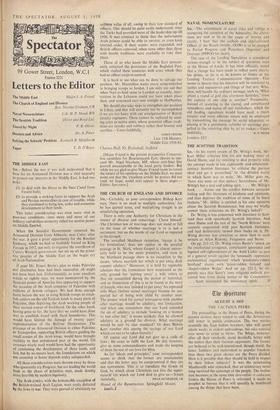Letters to the Editor
The Middle East Major J. A. Friend
The Church of England and Divorce Rev. Nicolas Grahatn,CR Naval Nomenclature Cdr. H. P. Mead, RN The Scottish Tradition Oliver and Boyd Ltd.
Travel by Night P. R. Oliver Doctors and Advice Dr. A. Piney Solving the Schools' Problem Kenneth R. Middleton Taper E. D. O'Brien THE MIDDLE EAST
SIR,—Before the war it was well understood that a base for an Armoured Division was a vital necessity to protect our interests in the Middle East. It had two tasks:
(I) to deal with the threat to the Suez Canal from Fascist Italy; (2) to provide a striking force to support the Arab and Persian monarchies in case of trouble, while they continued to bring law, order and economic development to their lands.
This latter consideration was even more vital in post-war conditions, since more and more of our military and civilian economy relied for motive power on Middle EasPOil.
When the Socialist Government removed the Armoured Division from Abbassia, near Cairo, after the war, it gave a great opportunity for the Russian Embassy, which we had so foolishly forccd on King Farouk in 1952, not only to organise the overthrow of Cairo's Western government, but stir up all the primi- tive peoples of the Middle East on the bogus cry of Arab Nationalism.
If poor Mr. Ernest Bevin's plan to make Palestine our alternative base had been successful, all might not have been lost. Unfortunately, as your excellent article so rightly says, we were manoeuvred by the financial power of America into appearing, o support the invasion of the Arab countries of Palestine with millions of Jewish refugees. We had done enough harm before the war in using British troops to estab- lish settlers on the old 'Turkish lands in many parts of Palestine, thus depriving the Arab working people of their normal source of livelihood. On the other hand, having gone so far, the least that we could have done was to establish Israel with fixed boundaries. This would have limited the damage of twenty years' implementation of the Balfour Declaration. The Presence of an Armoured Division in either Palestine or Transjordan, supporting British officers guiding the small armies of the Arab kings, would have brought stability to that unbalanced part of the world. Oil revenues wisely used would have had the opportunity of continuing the development of these lands, and last, but by no means least, the foundations on which our economy at home depends today safeguarded.
All these considerations were thrown away by those who ignorantly cry Progress, but are leading the world back to the chaos of primitive man, made doubly more horrible by modern ingenuity.
The Arab armies, with the honourable exception of the British-trained Arab Legion, were easily defeated by the Jews in war. They were proved of absolutely no
military value at all, owing to their low standard of officers. This should be quite easily understood, since the Turks had provided most of the leadership up till 1920. It was criminal to think that the unfortunate Arab princes could be able to survive, or even keep internal order, if their armies were expanded, and British officers removed, when none other than those with bandit traditions were available to take their place.
Those of us who know the Middle East perman- ently criticised the provisions of the Baghdad Pact, which stuffed these countries with arms which they had no officer corps to control.
It is hard to see what can be done to salvage our position. Mr. Macmillan wants every congratulation in bringing troops to Jordan. I am only too sad that when Nuri es-Said came to London so recently, inter- vention in the Lebanon could not have taken place then, and armoured cars sent straight to Habbaniya.
We should also take steps to strengthen our position in Libya, and that will certainly not be accomplished if we are too hasty with our amalgamation of British cavalry regiments. These cannot be replaced by send- ing arms to native units, whose potential officer tradi- tions are murder and robbery rather than honour and sacrifice.—Yours faithfully,
JAMES FRIEND
Late 11th Hussars. Middle East 1936-43.
Charnes Hall, Nr. Eccieshall, Stafford [Major Friend is the present prospective Conserva- tive candidate for Bournemouth East, chosen to suc- ceed Mr. Nigel Nicolson, MP, whose anti-Suez line proved unacceptable to the local party leaders. But while we are glad to give Major Friend room to reveal the nature of his opinions on the Middle East, we must point out that the 'excellent article' he praises did not (and, we hope, could not) appear in these pages.— Editor, Spectator.]






























 Previous page
Previous page